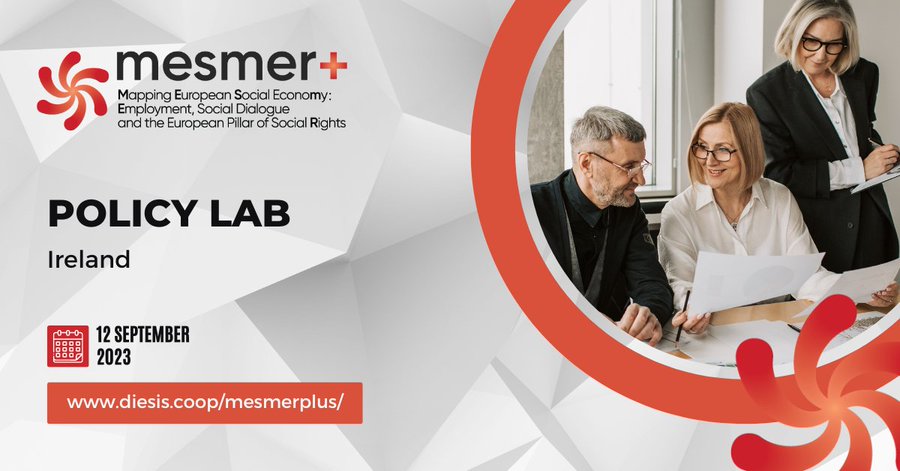FROM DIESIS
Are you passionate about shaping policy and making a positive impact? Are you eager to share your insights, exchange ideas, and contribute to improving SE national systems? Then join this event.
The MESMER+ aims to establish an up-to-date in-depth mapping on activity and representation of social
economy players – both from the employers’ and employees’ side – within social dialogue institutions and
various industrial relations settings in nine countries: Belgium, Bulgaria, France, Italy, Ireland, North Macedonia,
Poland, Spain and Sweden. This mapping encapsulates several dimensions, including institutions, actors,
practices and processes.
The national policy labsin each country serve to collect input and feedback from national level stakeholders such
as representatives of policy makers, social economy organizations, trade unions, employer’s organizations and
experts. It also serves to disseminate project results.
Furthermore, the policy lab in Ireland focuses on exploring the specificities of the social economy in relation to
the Irish social dialogue model. The involvement of social economy representative organisations in the regional
policy-making processes will also be discussed.
Please note that there is no online option available to attend this meeting.
13.30 – 14.00 Registration, snack and coffee + networking
14.00 – 14.10 Welcome speech
• Brian McGann, Director, IDEAS, Ireland
14.10 – 14.30 About the Mesmer+ project and introduction of the policy brief
• Kevin P O’Kelly, external researcher, IDEAS, Ireland
14.30 -15.30 Discussion
The participants will be invited to discuss and share their practical experiences of social dialogue
by addressing more specifically the following questions:
• Sectoral representation of the social economy/social profit sector between the various joint
committees: an adequate organisation for the needs of the field?
• Are there rules and norms related to the organisation of social dialogue (e.g., bipartite or
tripartite structure of representative bodies, collective labour agreements) that are difficult
to apply in social economy organisations?
• What are the specific features of the social economy that it would be useful to distinguish in
social dialogue so that it corresponds to the realities of this economic model?
• Should special mechanisms for social dialogue be set up in the social economy (enterprise
and/or sectoral level)? If so, what would these mechanisms look like and why?
15.30 – 16.00 Snack and coffee + networking
16.00 – 17.00 Formulation of recommendations, final conclusions
17.00 End of event
The event is moderated by Brian McGann, Director, IDEAS


